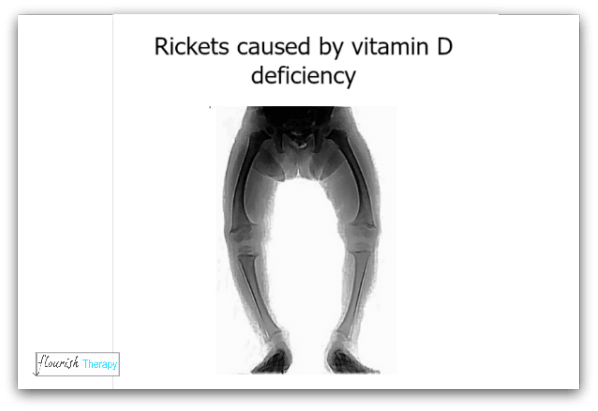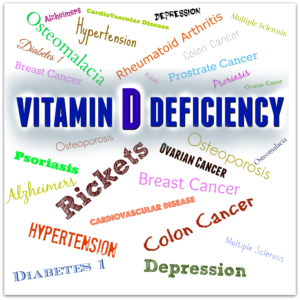Symptoms of Vitamin D Deficiency
Symptoms of vitamin D deficiency
Vitamin D deficiency is reaching epidemic proportions. Vitamin D deficiency affects most aspects of our health, including the immune system, cardiovascular system, our major organs and our brain. Vitamin D receptor cells are found in most parts of the body and it is for this reason that vitamin D deficiency has such a negative and far-reaching impact on our health.
How do we get vitamin D?
Vitamin D is found in some foods, but in only small amounts which are unlikely to make any lasting or significant effect on our health. Sunshine is what we need. UV light from the sun’s rays provides us with all the vitamin D we require. It is important to note, however, that our skin colour, age, time of day, time of year, latitude (how close to or far away from the equator we live) has a bearing on the amount of vitamin D we are able to create in our bodies.
Click here to read more about the importance of UV light on our overall health.
Why UV light is so important
UV light, ultraviolet light, is necessary for our skin to create vitamin D which is commonly regarded as the sunshine vitamin. It deserves its title. We have evolved as a species to need vitamin D to maintain good health and balance within the body.
We are on the verge of an epidemic of vitamin D deficiency as more and more of us spend less time outdoors away from the life-giving sunlight that is vital for our survival.
Rickets, once considered to be a bone disease of the early 1900s, is now re-occuring in large proportions of the population. Rickets is not the only concern. Vitamin D deficiency can lead to osteoporosis (brittle bone disease), osteomalacia (bone softening disease), multiple sclerosis, high blood pressure, cardiovascular disease, depression, rheumatoid arthritis, diabetes and some cancers.
Vitamin D receptor cells are found in nearly every cell of the body which is why it is so important to maintain optimal levels of vitamin D. It also manages levels of calcium and phosphorous in the blood, bones and gut and helps cells all over the body to communicate properly. In short, vitamin D is vital to our survival. We need exposure to UV light, especially as foods which contain vitamin D, hold such a small proportion of our daily needs, that they alone are insufficient to maintain health.
As vitamin D receptor cells are found in most places of the body, it is natural to conclude that the symptoms of vitamin D deficiency are very serious indeed.
Vitamin D and bones
Vitamin D deficiency is most famously noted for rickets in children. It is also recognized to be responsible for bone-related diseases such as osteoporosis (brittle bone disease) and osteomalacia (bone softening disease). Many people suffering from non-specific aching bones and muscles have been diagnosed eventually to having a lack of vitamin D. Vitamin D is very important for strong bones as it helps the body to metabolize calcium and phosphorous which are essential for creating strong and healthy bones. Without vitamin D, calcium and phosphorous cannot be absorbed by the body.
Vitamin D and multiple sclerosis
There is evidence of higher incidence of MS the further away you were born and spent your early years from the equator. Research has shown there is a 50-70% reduction in MS lesions when UV exposure is at its maximum in summer compared to winter. A study in Tasmania showed that adequate sun exposure, particularly in winter, between the ages of 6-15 reduced the risk of developing MS in later life by about two thirds.
Some cells in the immune and nervous systems have vitamin D receptors which means that vitamin D plays a role within those cells. In laboratory tests, when immune cells are exposed to vitamin D, they become less inflamed, which could mean that vitamin D boosts the immune system, making it less likely to attack other cells in the body. Higher vitamin D levels also suggest a slower progression of MS and reduced degree of disability for those with MS.
Vitamin D and diabetes mellitus
Diabetes mellitus (Type 1) appears to have a close relationship with vitamin D. Type 1 diabetes is an auto-immune disease where the immune system attacks the body. Specifically, the immune system attacks beta-cells which are needed to produce insulin. Even for people with normal blood sugar levels, a lack of vitamin D can lead to pre-diabetes and more than doubles your risk for progressing to type II diabetes.
Vitamin D receptor cells are found in the insulin-producing cells of the pancreas, fat, the liver and muscle tissue, all of which play an important role in synthesizing glucose in your blood. Studies show that as you move closer towards the equator, the risk of developing diabetes mellitus falls by a factor of 15. Also, children who took vitamin D supplements during their first year of life are less likely to develop diabetes mellitus later in life.
Vitamin D and cancer
Several studies have suggested that the incidence of certain cancers decreases the closer you live to the equator. The higher levels of UVB photons appear to help the body fight cancer cells that are found in the breast, colon, ovaries, uterus and prostrate. The reason it is thought that vitamin D helps to stave off cancer in these particular organs is the fact that vitamin D receptor cells are found in these organs, and these cells are important for regulating growth of cells and possibly preventing the cell developing into an unregulated cancer cell.
Some researchers have suggested that development of these types of cancer could be cut by 50% if vitamin D supplements were readily available to help make up the shortfall for people living in higher latitudes (further away from the equator).
Vitamin D and rheumatoid arthritis
Rheumatoid arthritis (RA) is an autoimmune disorder. Often the treatment for RA includes use of steroids which can have a negative effect on vitamin D levels within the body. In the case of this kind of treatment, it should be noted that vitamin D supplements may need to be taken. Many people who suffer from RA have lower levels of vitamin D. Researchers have suggested that vitamin D helps to inhibit inflammation in the body.
Vitamin D and dementia
Studies have suggested that vitamin D deficiency may double the risk of developing dementia. With moderately deficient levels of vitamin D it was predicted that risk of dementia may be increased by 53%, In cases of severe deficiency, the risk of developing dementia was more than doubled. Vitamin D receptor cells are densely located in areas associated with memory and thought processing. It is thought that vitamin D helps to clear plaques in the brain which are responsible for the onset of dementia.
Vitamin D and depression
The lower levels of vitamin D the more likely the risk of developing clinical depression. Vitamin D has an impact on the amount of serotonin produced within the brain. Serotonin helps to lift our mood and to cope during times of difficultly. When treated with vitamin D supplements, depression was significantly improved after a period of 12 weeks.
Vitamin D and cardiovascular disease
Cardiovascular events such as heart failure, myocardial infarction, stroke, or cardiovascular death have been linked to low levels of vitamin D. Studies have shown that vitamin D deficiency can increase the risk of suffering a heart attack by 50%. A much greater risk of dying from a heart attack has been linked to vitamin D deficiency. People who live at higher elevations and closer to the equator have lower occurrences of heart related diseases. People who live further away from the equator have higher risk of developing CVD. There are more CVD related incidences during the winter period. Vitamin D receptors have been found in all the major cardiovascular cell types, including the cardiac muscle found in the heart, arterial wall cells and the immune system.
Symptoms of possible vitamin D deficiency
Other than getting your vitamin D serum levels tested, there is no sure-fire way of determining if you are vitamin D deficient, however, if you are regularly suffering from any of the below, it may point to a vitamin D deficiency:
Sweaty head
If the rest of your body is not sweating, you are not performing any strenuous exercise, your core body temperature is 37C (98.6F), yet your head is sweating, this could be a sign of vitamin D deficiency.
Feeling blue
Serotonin is a neurotransmitter that affects how we feel. When we are feeling down or low, it could be that our serotonin levels are low. Sunshine, because of its production of vitamin D, affects the amount of serotonin we produce, so if we are low on vitamin D, it is likely that our serotonin levels could do with a boost. A lot of people suffer from SAD, seasonal affective disorder, which can be helped by the regular use of a SAD lightbox, which helps to boost vitamin D levels during the winter months.
There is a link at the bottom of this article to information and tips on how to make the right choice when buying a SAD lightbox.
Feeling lethargic
Vitamin D is required for us to feel motivated. If you are constantly feeling tired despite sleeping well, you might be advised to get your vitamin D levels checked
Muscle weakness
Vitamin D deficiency accounts for most muscle weakness. It can lead to you feeling heavy in the legs, tiring easily, having trouble climbing stairs. Muscle weakness due to vitamin D deficiency tends to be most notable in the legs and as people get older, the risk of falling, due to decreased muscle strength becomes an important factor to consider.
Aching bones
Bone pain is an indicator of vitamin D deficiency. Vitamin D is needed for the body to absorb calcium and phosphorous, which are vital for healthy bone development and maintenance. When these levels drop, breakages, joint and bone pain can become long-term problems.
Gut problems
Vitamin D deficiency has a negative impact on the healthy bacteria that live in our gut. The healthy bacteria help to maintain balance within the body, as well as producing B vitamins. In this case, vitamin D deficiency can also lead to vitamin B deficiency. Studies have shown there is a strong link between inflammatory bowel disease such as crohn’s and ulcerative colitis and vitamin D deficiency. It is thought that vitamin D can help to reduce the inflammation caused by inflammatory bowel disease and reduce complications related to the disease such as surgeries, colostomies and colon cancer.
Vitamin D deficiency is a life-threatening choice
Allowing ourselves to have a vitamin D deficiency is not an option. Not only do we need sufficient vitamin D, we ideally need to be aiming for an optimal level. The most important thing we can do is to commit to spend time outdoors, safely exposing our skin to the sun’s rays. Safe exposure means revealing as much skin as possible to the sun until it becomes the faintest pink. Importantly do not allow yourself to burn.
Exposure to the sun’s rays is absolutely vital for our overall health. It is clear that if we deprive ourselves from the naturally occuring UV light, we also deprive ourselves of a long and healthy life. The decision is an easy one to make: allow yourself time on a daily basis to spend a minimum of 20 minutes outside, and whenever possible, expose as much of your skin to the sun without breaking any laws!
Exposure to ultra violet light is as important to our health as getting a good night’s sleep. Help to make vitamin D deficiency a problem of the past and give your body what it needs in order to thrive.
SAD lightbox information: http://www.sad.org.uk/buying-a-sad-light/
[et_bloom_inline optin_id=optin_8]













